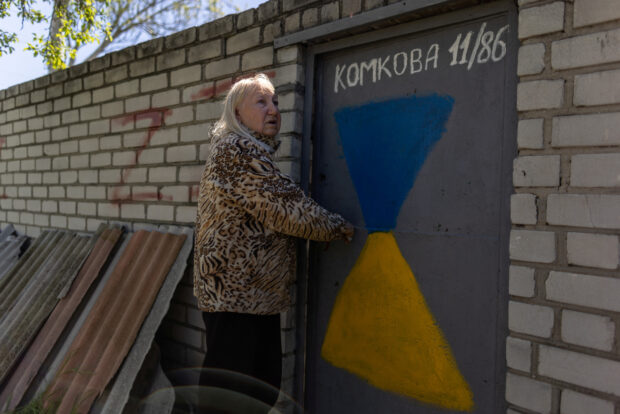Traitor next door? Fear stalks Kherson after Russian occupation ends

Valentyna Haras, 74, stands outside her home next to graffiti with the letter Z, painted by neighbours, which has become a symbol of the Russian military, as Russia’s attack on Ukraine continues, in Kherson, Ukraine, May 3, 2023. REUTERS
KHERSON, Ukraine — Valentyna Haras says she isn’t a traitor.
Nonetheless, her garden walls in the Ukrainian city of Kherson are covered with graffiti marking her out as a Russian collaborator. “Rashist” – a Ukrainian blend of Russian fascist – is scrawled in red paint. Accusatory “Z”s – symbols of support for Moscow’s war machine – are daubed liberally.
Fear and suspicion stalk the streets of Kherson, a southern port that was occupied by Russian troops for over eight months before they were driven out by Ukrainian forces in November. The city is now the focus of relentless Russian bombardment.
Six months on from the occupation, neighbors distrust neighbors. Traitors could be anywhere.
Haras, a district administrator, said four Ukrainian military personnel knocked on her door on Nov. 26, days after Russian troops left, and accused her of collaboration, a crime punishable by a maximum jail term of 10-15 years. They searched her house and seized her phone and computer, citing complaints from neighbors that she had encouraged residents to submit to the occupiers and take Russian passports, she added.
Article continues after this advertisementThe 74-year-old was subsequently questioned by police though she hasn’t been arrested or charged with any crime. She denies all the accusations against her and said she couldn’t understand why she was branded a collaborator, adding that she had been happy when the Russians were driven out.
Article continues after this advertisement“Honestly, I do not know,” she said in tears outside her home. “They didn’t find anything.”
Neighbour Iryna Nechevilova gave a different account.
“She openly supported the Russians and told everyone Russia was great, that she felt horrible under Ukrainian rule. It wasn’t a quiet confession,” Nechevilova said.
“The people were expecting her to be taken away right away. We wrote accusations against her for many months. But she wasn’t, and the people were shocked.”
Police at the local station where she said she was questioned declined to comment on the case. Ukraine’s military didn’t immediately respond to a request for comment.
Reuters was unable to verify independently Haras’ or Nechevilova’s version of events.
Accusations of collaboration have become a feature of everyday life across Ukraine as Russian forces have been driven back from swathes of territory they once occupied.
Russia has lost more than 40% of the territory it seized after launching a full-scale invasion in February last year, leaving it in control of almost a fifth of the country including Crimea, according to Oleksandr Musiyenko, a Kyiv-based military analyst.
More than 5,300 collaboration cases have been registered across the country, according to the prosecutor general’s website. It wasn’t clear what stage the cases were at and the prosecutor general’s office didn’t immediately respond to a request for comment.
Daily shelling by Russia
Tensions in Kherson are sharpened by the almost daily shelling by Russian troops entrenched on the opposite side of the River Dnipro. Some families are divided, with members living on different sides of the river.
In one day of particularly heavy shelling in early May, at least 23 people were killed in the city; many windows are still boarded up and buildings partially destroyed.
When the Russians seized Kherson, they held a referendum on whether the city and its region should become part of Russia, which Moscow said received resounding local backing, though Kyiv and Western nations dismissed the vote as a sham.
In a snapshot of the mistrust gripping communities, Reuters spoke to five residents who said they suspected acquaintances or officials had collaborated with Russian occupiers.
Since the city was taken, 152 criminal cases involving collaboration have been sent to the courts, said Serhiy Kalmykov, first deputy to the Kherson regional prosecutor. They related to 162 people, including local lawmakers, police officers, doctors, business people and residents, he added.
Fourteen people who were among the first cases to be tried have been found guilty so far, including some who urged others to vote in the referendum, Kalmykov told Reuters.
Kherson – along with some other parts of the country – has no functioning courts because of the conflict, slowing the process of bringing people to trial as hearings have to be held elsewhere, local officials said.
The cases seen so far could be the tip of the iceberg.
A spokesperson for the SBU security service in the Kherson region said it had identified 1,147 people involved in the organization and staging of the referendum, without giving details about those cases.
Traitor or survivor?
If Ukraine’s promised counteroffensive pushes the Russians further back, more villages, towns and cities are likely to undergo what Kherson is experiencing today.
Cases of collaboration can point to the tough choices people have to make when trying to survive under occupation.
For instance, some farmers could face prosecution because they registered their farms according to Russian rules under occupation just to keep their businesses going, according to the All-Ukrainian Agrarian Council lobby group.
The council cites the case of one farm owner who quit his farm in the Zaporizhzhia region after the area was occupied by Russian forces. He left the business to his workers, who had to register with the Russians and take Russian passports, and fears they could be prosecuted once the occupation ends.
Some lobby groups say laws governing collaboration are vague and should be amended to reflect the reality of people trying to continue to eke out a living while under occupation. Or, as the All-Ukrainian Agrarian Council put it, distinguish between “who is a traitor and who works for the sake of survival.”
RELATED STORIES